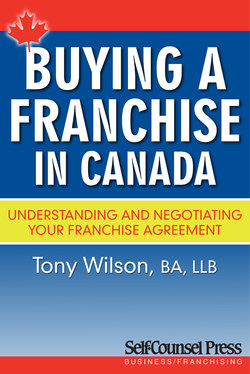Читать книгу Buying a Franchise in Canada - Tony Wilson - Страница 11
На сайте Литреса книга снята с продажи.
5. Are US-based franchisors required to give Canadian franchisees disclosure documents?
ОглавлениеUS-based franchisors do not always give and are not always required to give disclosure documents to prospective Canadian franchisees. As a prospective Canadian franchisee, you might not be provided with this information even if you ask for it.
It’s possible this material could be on the public record and a great deal of information can be learned about a US-based franchisor from its FDD. Accordingly, if you have been approached by a US-based franchisor, but have not been provided with a copy of its FDD, you should ask for it. If the US franchisor refuses to give you a copy of its FDD (your heightened sense of suspicion having now been justifiably aroused), you might well wonder why, given that it is normally a publicly obtainable document and you can probably get a copy of it from the private company FRANdata (www.frandata.com) or from FranchiseHelp (www.franchisehelp.com).
The following list outlines the types of “material facts” that would be useful for you to know in advance of making your decision to buy into the concept:
• Bankruptcy and previous convictions of principals
• Outstanding litigation against or by franchisees
• Net worth of the franchisor
• Expected range of a franchisee’s initial investment costs
• Product and service restrictions
• Number of units that have ceased doing business (i.e., failed) in the previous 12-month period
• Names and addresses of existing franchisees
• What the standard form of franchise agreement looks like
• Other facts that the franchisor’s lawyers have deemed to be material and therefore must be disclosed
• Litigation against the franchisor and its directors and officers
A good reason why you might not be given a copy of the disclosure document is because it’s irrelevant to you and has little or no bearing on the franchisor with whom you would be contracting, such as in circumstances in which a prospective Canadian franchisee is not contracting directly with the American franchisor (which is subject to US regulation), but with a Canadian subsidiary or master franchisee (which may not be subject to US regulation). In other words, this information could be very valuable to you if you were negotiating and contracting directly with the US-based franchisor that is the subject of the disclosure document.
Quite often, the American-based franchisor has “master franchised” or otherwise licensed its rights to franchise all of Canada (or certain Canadian provinces) to someone else; normally an unrelated Canadian company with different directors, officers, and shareholders than the US franchisor and with a totally different corporate history. (See Chapter 3 for more information on master franchising.) Or perhaps the US franchisor has created a Canadian subsidiary to franchise in Canada, and this subsidiary company is not bound by US laws. In that case, all the information you have obtained on the franchisor isn’t quite as helpful as you might have first thought because the franchisor isn’t the party you’re dealing with.
For information on Canadian disclosure documents, see Part 3 of this book.
